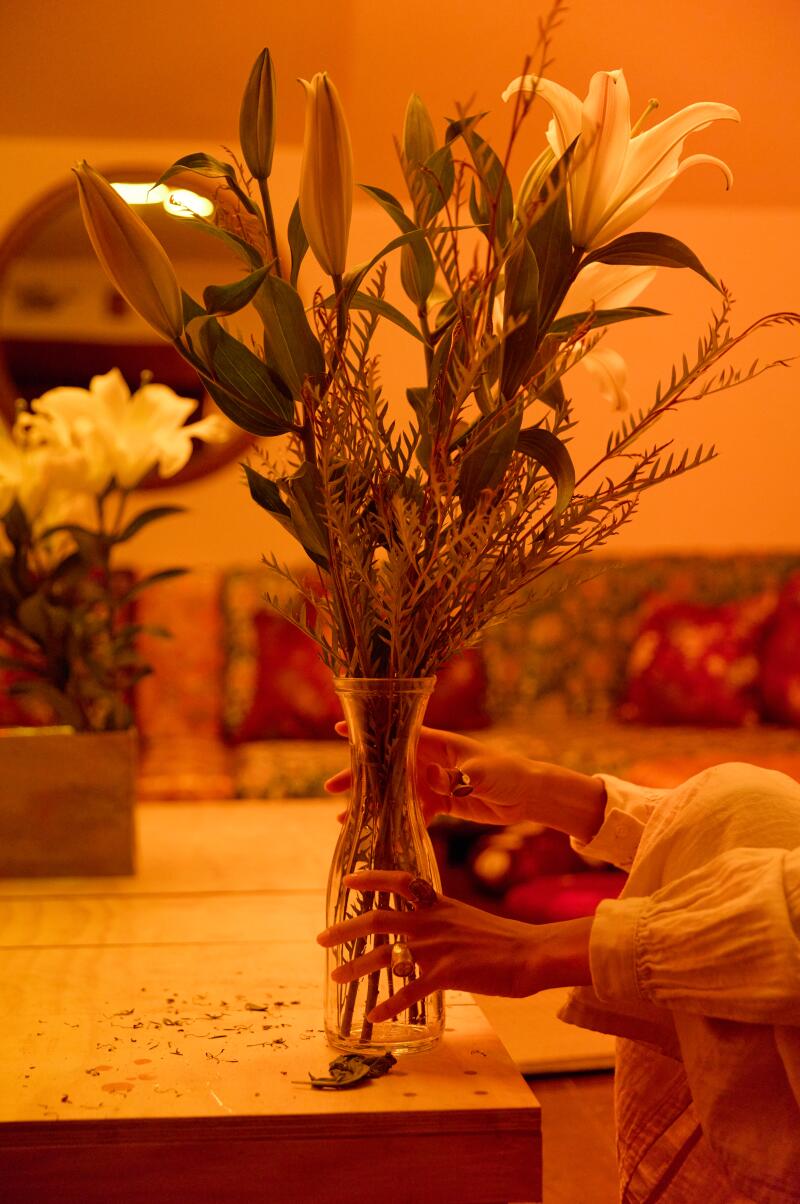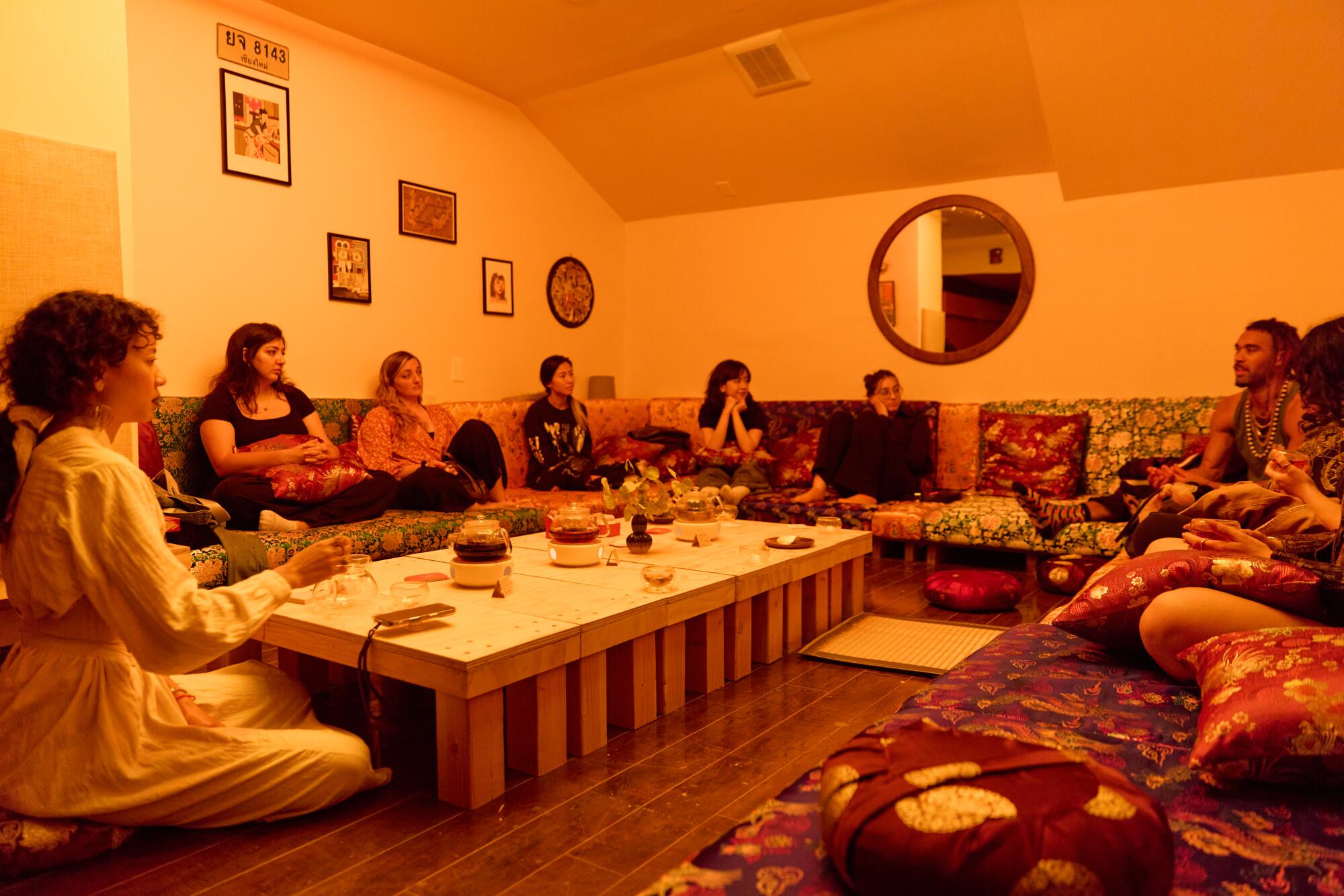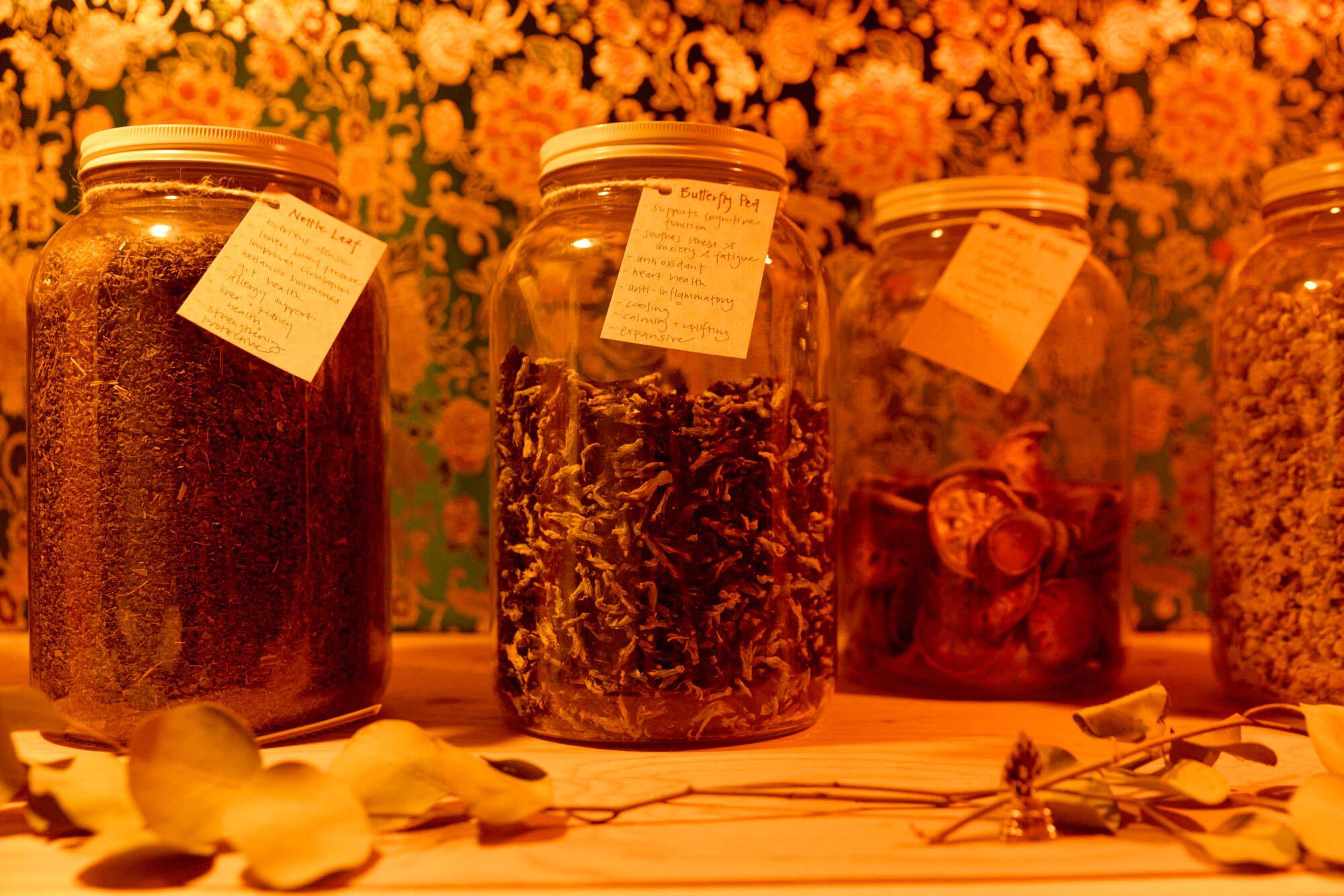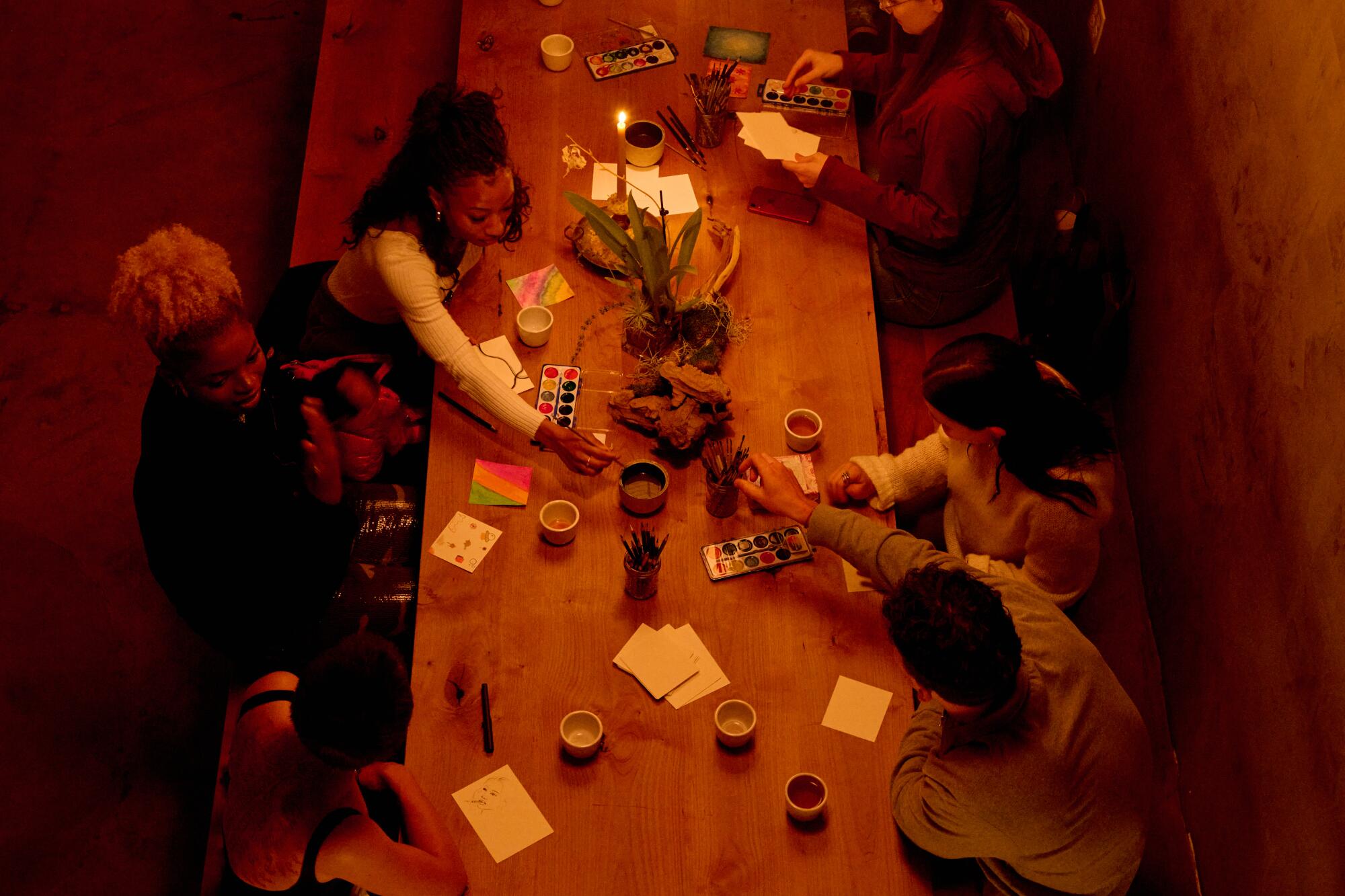Teahouses built for spending extended time in, open until the wee hours of the night, are popping up all over the city. Some are elusive, hidden in plain sight or only accessible via a mysterious membership. Others have gone viral on TikTok and have cover charges and waitlists to attend. Some reference East Asian tea ceremony culture, others lean California cool and bohemian.
Jai Tea Loft owner Salanya Angel Inm prepares tea at her recently opened social gathering space in Koreatown.
(Dante Velasquez Jr. / For The Times)
Why the surge in places to drink tea? It might be because young people are consuming less alcohol (a 2023 study from Gallup found the number of people under 35 who drink has dropped 10% over the last two decades). Or maybe it’s due to the fact that the city has lost a sizable chunk of restaurants open past 10 p.m. — LAist reports nearly 100 since 2019 — leaving fewer places to sit and chat that aren’t bars or clubs. At the same time, activities centered on wellness and reflection, like gratitude groups, journaling or even reading silently in public, are being embraced by people of all ages looking for third spaces and activities outside of the standard dinner-and-a-movie.
Salanya Angel Inm was inspired to open Jai in Koreatown after years of feeling that Los Angeles lacked late-night spaces not oriented around alcohol. She wanted to create an alternative for her community of creatives, a place they could spend long hours loosening up outside of a bar environment. Lydia Lin, co-founder of Steep in Chinatown, which does serve alcohol along with plenty of tea, wanted a place that was open late but was peaceful enough that she could hear her friends while having a conversation.
Enter the rise of the teahouse. Despite their design and menu differences — some have a dozen herbal blends, others opt for dealer’s choice with a rotating set of three bespoke infusions; some are places to debut a trendy outfit, a few ask visitors to remove their shoes — they each come from a desire to challenge a typical consumer experience. These are spaces meant for lingering long after tea has been purchased, or even finished.
Below are four teahouses in different neighborhoods of Los Angeles.
Jai



Scenes from a Saturday night in May at Jai Tea Loft. (Dante Velasquez Jr. / For The Times)
Located above Thai Angel, known for its DJ sets and late-night noodles, newly minted teahouse Jai offers a quieter, more intimate space to spend weekend nights. The spot is owned and operated by Thai Chinese American model and breathwork and reiki practitioner Salanya Angel Inm, who co-owns Thai Angel with her mom and brother. She began tinkering with the idea of opening a teahouse in May 2022. In January 2024, construction began, with a soft opening following in March 2025.
Jai is housed in a one-room attic on top of Thai Angel. It’s cozy, with space for two dozen people at most. The room glows in yellow-orange light from a neon art piece fixed to the ceiling and is lined with brightly colored custom floor cushions made of fabric from Thailand. On a Saturday night in March, seven guests removed their shoes and sat for a storytelling event, ticketed at $10. This was the second installment of the event; Inm had selected the theme “Lucky to be alive.” Some guests recited poetry, while others freestyled between sips of tea. The group exchanged stories and lounged until 3 a.m.

Guests socialize on a Saturday night at Jai Tea Loft in Koreatown.
(Dante Velasquez Jr. / For The Times)
Jordan Collins bought a ticket for storytelling at Jai after hearing about it on Inm’s social media. Upon arrival, he ordered a herbal elixir featuring Asian botanicals from the brand Melati. It’s one of three premade nonalcoholic tonics (the other two are “Awake” and “Calm” by California-based brand Dromme) that Jai serves room temperature for $9. A fan of art shows and experimental music performances, Collins described himself as always on the lookout for new community spaces. “I think that was the first time I pulled up to anything completely solo with no expectations, with the full intention to yap for however long to a room with complete strangers,” he said, likening his experience to a night spent chatting with friends into the morning.

The tea selection at Jai Tea Loft.
(Dante Velasquez Jr. / For The Times)
The current menu at Jai consists of hot tea, sold by the glass or pot, along with the herbal elixirs — one invigorating, one calming and one berry. Tea drinkers can choose between more than a dozen herbs, from butterfly pea to white chrysanthemum, to create a custom blend prepared by Inm, starting at $15 per 25-ounce pot or $6 for a single serving. Behind the tea bar, she offers customers guidance based on their mood and needs.
She may expand the menu going forward but plans to keep costs low. “I really don’t like the idea that people can only access things that are good for them if they have a large amount of money to invest in themselves. I want people to feel like, ‘Yeah, I can swing that for this experience’ and it not be this obstacle,” said Inm.
Koreatown
149 N. Western Ave., Los Angeles, CA (upstairs)
Soft opening, see Instagram for hours
Tea at Shiloh



Patrons at Tea at Shiloh on a recent Saturday. (Yasara Gunawardena / For The Times)
Only 45 customers can enter Tea at Shiloh per evening, and those hoping to visit should plan ahead: Reservations, which are required, can be made through the website, and Tea at Shiloh fully books nearly every night.
As each attendee enters and takes off their shoes and adds them to the disorganized pile near the front of the door, a host asks them their intention for the evening. Patrons of the Arts District teahouse know what they’re getting into and answer the question with ease. The space attracts a metaphysically minded, wellness-oriented community. Some are there to journal, others to spend time with old friends. A few want to get out of their comfort zone; they come on dates, join with friends and arrive alone.

Guests socialize at Tea at Shiloh: A Teahouse.
(Yasara Gunawardena / For The Times)
The concept for Tea at Shiloh came to owner Shiloh Enoki (who goes by the mononym Shiloh) in 2019. Shiloh, who was born in Utah and is of South American descent, found herself unfulfilled working for a record label in Hollywood. She underwent a personal transformation that led to her quitting her job and legally changing her name. After a visit to a teahouse in San Francisco that closed in the afternoon, she couldn’t stop thinking how nice the experience would have been at night. She found herself looking for late-night teahouses back home in Los Angeles on Google Maps. To her surprise, she couldn’t find any. “I couldn’t believe that something that was in my brain didn’t exist on Google. I was like, ‘It has to be somewhere. It has to be somewhere in L.A.’ I live in one of the biggest cities in the world and nothing … I became obsessed,” she said. Shiloh began exploring herbalism and hosting friends and strangers at her home for tea, then decided to create a business that would provide what she’d been searching for. She opened the space in 2022.

Faith Bakar, Alexsys Hornsby and Rachel Angelica painting at Tea at Shiloh.
(Yasara Gunawardena / For The Times)
Tea at Shiloh is inside an industrial loft. Brick walls and exposed piping contrast with wooden furniture, white couches and floor cushions and the warm glow of Noguchi lampshades. Surfaces are covered in books, tarot cards, clay and other art supplies to make use of. From 10 a.m. to 3 p.m., laptops are welcome. For the evening shift, which goes from 7 to 10 or 11 p.m., the lights go down and laptops are banned (with an exception for Monday’s piano lounge events). Both time slots require prepaid reservations, which, day or night, start at $37 and include unlimited access to the only thing on the menu, a rotating selection of three custom tea blends by Shiloh’s herbalists.
On some nights, there’s live music; others feature workshops in journaling, ceramics and other mind-body activities and performances. “It’s not a singular experience. There’s something for everyone,” Enoki said. After discovering the space on TikTok, Cooper Andrews took his partner to “cosmic jazz” (an eclectic mix of saxophone, keys, and abstract vocal looping) night at Shiloh to celebrate her birthday. He was looking for something other than just another fancy dinner, and for him, the $47-per-person cover charge was well worth it. “I see the fee as a cover charge. It’s like going to a museum,” he said.
Arts District
2035 Bay St., Los Angeles, CA 90021
Reservation only
Steep LA

Steep LA in Chinatown.
(Solomon O. Smith / For The Times)
Friends Samuel Wang and Lydia Lin come from cultures that take tea seriously. Wang, an industrial designer, is Taiwanese, while Lin, a marketing MBA working in the legal field, is Cantonese. In 2019, they separately went on trips to Asia to visit their families and discovered how modernized traditional teahouses had become. “[In China] people our age were going to teahouses instead of bars or clubs. It was somewhere that wasn’t home to just hang out and be able to have a conversation,” said Lin. “Why didn’t this exist in L.A.?” the friends asked themselves.
Within six months, thanks to the help of their Chinatown community, Lin and Wang — who didn’t quit their day jobs — opened Steep in the fall of 2019. Opening night was the Chinese Mid-Autumn Festival, Lin remembers, an important and auspicious day.
The minimalist tea lounge hides in the back of a plaza in Chinatown. There’s space inside for a few dozen guests and a handful of outdoor tables for when weather permits. Inside, there’s a beautiful marble bar, wood tables, a cozy couch and long tables with tea leaves in jars to smell and discover.
By day, Steep serves 10 rotating teas, all sourced from China and Taiwan. Customers can order a glass of cold-brewed tea or fresh-brewed tea, but Lin encourages a tea ceremony, which comes with a pot and up to four cups. Baristas walk guests through the steps of brewing and pouring the tea, providing a timer for the perfect steep.
By night, Steep is the only business open in its plaza. Inside, soothing R&B plays. And, unlike the other teahouses that have popped up recently in Los Angeles, Steep serves alcohol. After 5 p.m., the space shifts from cozy teahouse to experimental mixology bar, serving boozy concoctions that all feature tea as an ingredient. Take the Yuanyang Martini, an espresso martini with black sesame and black tea or Red Robe, featuring cognac, bourbon, oolong tea and white miso. At 9 p.m. on a Thursday in March, nearly every seat was filled. Half of the guests enjoyed cocktails, while the rest shared pots of tea.
Chinatown
970 N. Broadway #112, Los Angeles, CA 90012
11 a.m.-11 p.m. daily; closed Tuesday
NEHIMA
There’s no information about NEHIMA online except for an email address. The invite-only, membership-based Japanese teahouse opened in Los Feliz in 2022. It’s more exclusive than any Soho House, San Vicente Bungalows or Bird Streets Club. So much so that its founders, Miho Ikeda and Richard Brewer, also co-owners of New High Mart, an equally exclusive Japanese home goods boutique, agreed only to speak about their latest venture via email.
“Serving tea to-go is to miss the entire point of tea. Tea is time. An excuse to enjoy a moment, a pause, a rest — either with oneself or the company of others,” said Brewer. The space has a strict no-technology policy. Even smartwatches are required to be checked in lockers along with phones.
At NEHIMA, all tea is served made-to-order, tableside, in pieces from the owner’s collection of Japanese ceramics. There are no matcha, lattes or novelty drinks on the menu, only loose-leaf tea sourced from Japan. NEHIMA is careful to distinguish that while the space and experience recall Japanese tradition, the club does not offer an official tea ceremony. “That term is thrown around too easily these days and should be reserved for describing the very specific event, ‘Cha-No-Yu,’” said Brewer.
The founders said the average visit is between three and six hours. Where most members clubs try to offer a luxurious experience for the wealthy through elevated design, upscale food and posh clientele, taking time to relax and enjoy a pot of tea is what NEHIMA sees as the ultimate luxury. “In this busy demanding world, time is the new flex, and real wealth is taking time to stare into a bowl of tea,” said Brewer.
Los Feliz
4650 Kingswell Ave., Los Angeles, CA 90027
Members only




